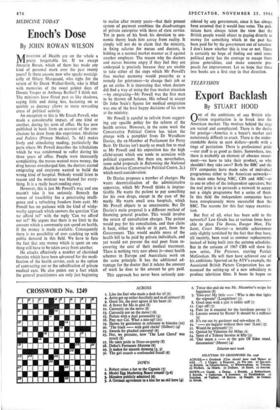Enoch's Dose
MEDICINE TODAY
By JOHN ROWAN WILSON
An exception to this is Mr Enoch Powell, who made a considerable impact, of one kind or another, during his term of office. He has now published in book form an account of the con- clusions he drew from this experience. Medicine and Politics (Pitman Medical, 7s. 6d.) makes lively and stimulating reading, particularly the parts where Mr Powell describes the tribulations which he was condemned to suffer during his three years of office. People were incessantly complaining, the nurses wanted more money, the drug houses overcharged him, the doctors started emigrating and everyone wanted to build the wrong kind of hospital. Nobody would listen to reason and the minister was blamed for every- thing. It is a really heart-rending story.
However, this is just Mr Powell's way and one mustn't take it too seriously. Beneath the veneer of irascibility lies a penetrating intelli- gence and a refreshing freedom from cant. Mr Powell has no patience with the kind of wishy- washy approach which answers the question 'Can we afford to?' with the reply 'Can we afford not to?' He argues that there is no limit to the amount which a community can spend on health, if the money is made available. Consequently there is no possibility of ever catching up with public demand in this field. We have to face the fact that any money which is spent on one thing will have to be taken away from another.
He attacks effectively a number of cherished theories which have been advanced for the modi- fication of the health service, such as the option of contracting out or the subsidisation of private medical care. He also points out a fact which the general practitioners are only just beginning
to realise after twenty years-that their present system of payment combines the disadvantages of private enterprise with those of state service. Yet in parts of his book his devotion to eco- nomic theory leads him astray from reality. It simply will not do to claim that the ministry, in fixing salaries for nurses and doctors, is bidding in a normal market manner as if against another employer. The reason why the doctors and nurses become angry if they feel they are underpaid is precisely because they are unable to take either of the steps which Mr Powell's free market economy would prescribe as a remedy for grievances-to change their job or go on strike. It is interesting that when doctors did find a way of using the free market situation -by emigrating-Mr Powell was the first man to be thrown off balance. His refusal to accept Dr John Seale's figures for medical emigration was one of the least happy decisions of his term at the ministry.
Mr Powell is careful to refrain from suggest- ing any specific policy for the reform of the health service. However, in the same week the Conservative Political Centre has taken the plunge with a pamphlet from Dr Wyndham Davies, the ex-Member of Parliament for Perry Barr. Dr Davies isn't nearly so much fun to read as Mr Powell and his exposition has the high cliché-count which one tends to associate with political argument. But there are, nevertheless, some solid proposals in Reforming the National Health Service (Conservative Political Centre, 2s.) which merit consideration.
Dr Davies proposes a number of changes. He wants decentralisation of the administrative apparatus, which Mr Powell thinks is imprac- ticable. He wants the patient to pay something for his own drugs, except in the case of the needy. He wants small area hospitals, which Mr Powell objects to as uneconomic. But Dr Davies's main proposal is a different method of financing general practice. This would involve the return of consultation charges. The patient would pay for his consultation, and then claim it back, either in whole or in part, from the Government. This would enable more of the health bill to be paid by private individuals, and yet would not prevent the real poor from re- covering the cost of their medical treatment. There is nothing very new about it-most health schemes in Europe and Australasia work on the same principle. It has the additional ad- vantage for the doctor that it relates the amount of work he does to the amount he gets paid.
This approach has never been seriously con- sidered by any government, since it has always been assumed that it would lose votes. The poli- ticians have always taken the view that the British people would object to paying directly in money for something which in the past has been paid for by the government out of taxation. I don't know whether this is true or not. There is certainly no hope of finding out until some political party has the courage to escape from pious generalities, and make concrete pro- posals for improvement. Let us hope that these two books are a first step in that direction.














































 Previous page
Previous page